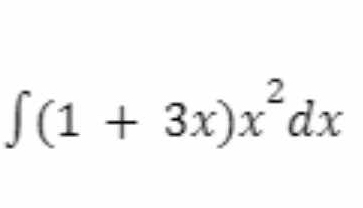∫(1 + 3x)x² dx

Understand the Problem
The question is asking to solve the integral of the expression (1 + 3x)x² with respect to x. This involves applying integration techniques.
Answer
The integral is given by: $$ \frac{x^3}{3} + \frac{3x^4}{4} + C $$
Answer for screen readers
The final answer is: $$ \frac{x^3}{3} + \frac{3x^4}{4} + C $$
Steps to Solve
-
Expand the expression
First, expand the integrand, $(1 + 3x)x^2$: $$ (1 + 3x)x^2 = x^2 + 3x^3 $$ -
Set up the integral
Now rewrite the integral with the expanded expression: $$ \int (x^2 + 3x^3) , dx $$ -
Integrate term by term
Now, integrate each term separately:
- The integral of $x^2$ is: $$ \int x^2 , dx = \frac{x^{3}}{3} $$
- The integral of $3x^3$ is: $$ \int 3x^3 , dx = \frac{3x^{4}}{4} $$
-
Combine the results
Now, combine the results of the integrals: $$ \int (1 + 3x)x^2 , dx = \frac{x^3}{3} + \frac{3x^4}{4} + C $$ -
Write the final answer
Include the constant of integration $C$: $$ \frac{x^3}{3} + \frac{3x^4}{4} + C $$
The final answer is: $$ \frac{x^3}{3} + \frac{3x^4}{4} + C $$
More Information
This integral involves basic polynomial functions, and integrating each term separately is a common technique in calculus. The constant of integration, ( C ), represents any constant value since indefinite integrals can vary by a constant.
Tips
- Forgetting to include the constant of integration ( C ) when computing indefinite integrals.
- Not expanding the integrand correctly before integrating.
AI-generated content may contain errors. Please verify critical information